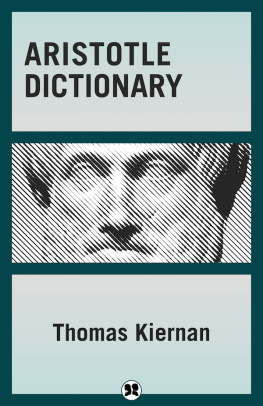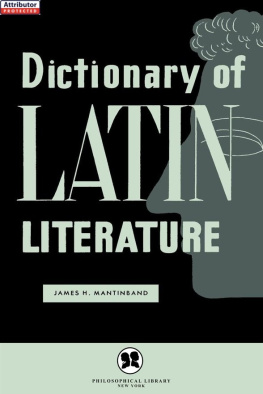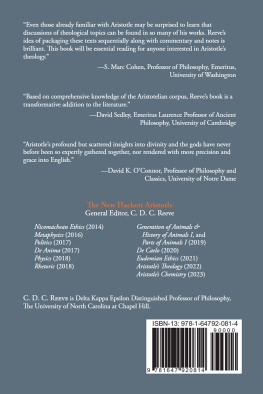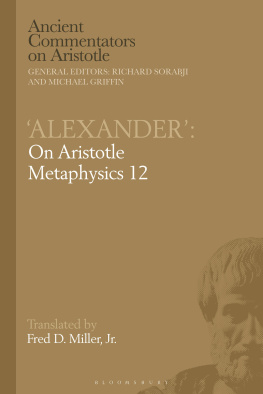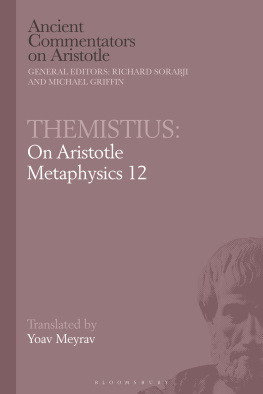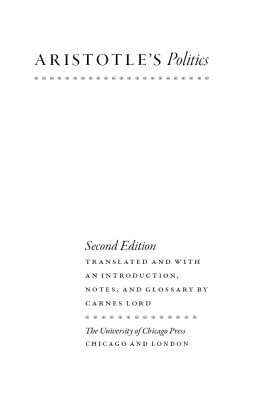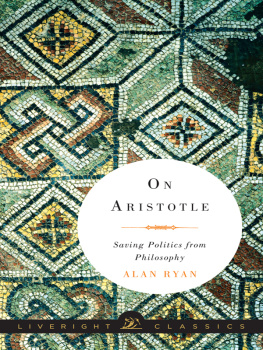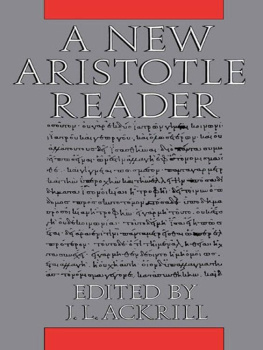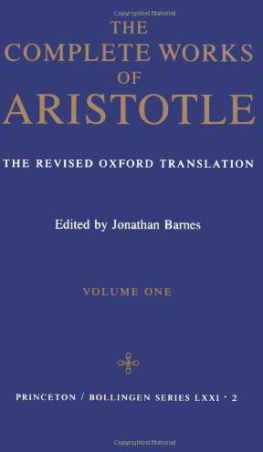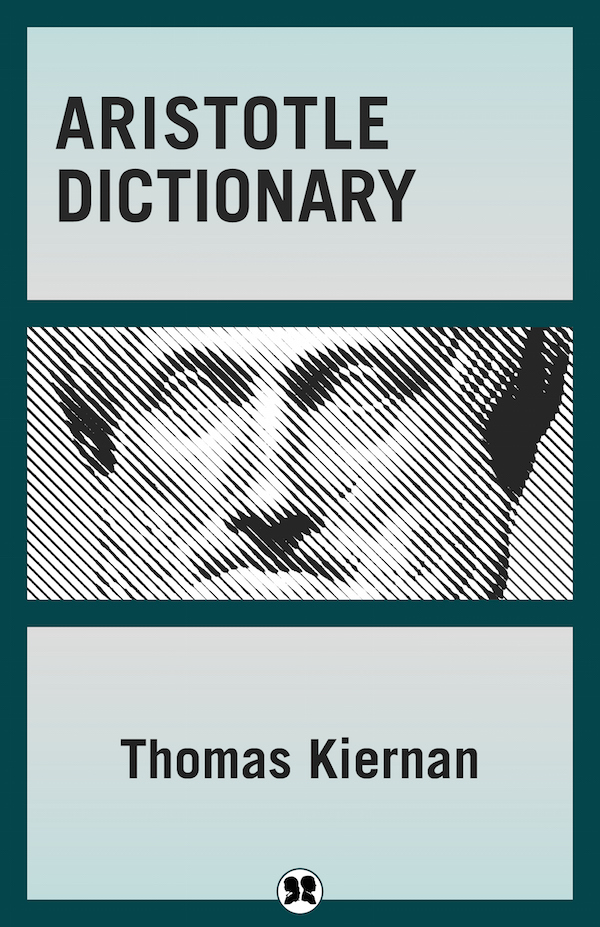BIBLIOGRAPHY
De Anima. Trans. into French by J. B-Saint-Hilaire. Paris: Librairie de Ladrange, 1846. Trans. by H. E. W.
De Partibus Animalium. Translated by T. Taylor. 9 volumes. Printed for the translator by R. Wilks, 1806-1812. Also by H. E. W.
Metaphysics. Trans. by J. H. MMahon. London: Bell, 1874.
Physics. Translated by T. Taylor.
Historia Animalium. Trans. by T. Taylor. Also H. E. W.
Politics. Trans. by E. Ealford. London: Bell, 1885
Constitution of Athens. Trans. by T. J. Dymes. London: Seeley and Co., 1891.
Poetics. Trans. by T. Buckley. London: Bell, 1872.
Magna Moralia. Trans. by T. Taylor.
Nicomachean Ethics. Trans. by R. W. Browne. London: Bohn, 1850.
Eudemian Ethics. Trans. by T. Taylor.
Rhetoric. Trans. by T. Buckley. London: Bell, 1872.
Organon, comprising:
Categories.
De Interpretatione.
Prior Analytics.
Posterior Analytics.
Topics.
Sophistici Elenchi.
Trans. by O. F. Owen. 2 vols. London: Bell, 1893, 1895.
De Caelo. Trans. by T. Taylor.
De Generatione et Corruptione. Trans. by T. Taylor.
Meteorologica. Trans. by T. Taylor.
Parva Naturalia, comprising:
De Sensu et sensibili.
De Memoria et reminiscentia.
De Somno.
De Somniis.
De Divinatione per somnum.
De longitudine et brevitate vitae.
De vita et morte.
De respiratione.
Trans. by T. Taylor.
De Incessu Animalium. Trans. by T. Taylor.
De Motu Animalium. Trans. by T. Taylor.
De Generatione Animalium. Trans. by T. Taylor.
A
Abstinence
He who avoids all pleasures, like a boor, is an insensible sort of person.
N E2. 2. 1104a24-25
Accent, Fallacy of
But concerning accent... it is not easy to frame an argument except in writings and poems as, for instance, some defend Homer against those who accuse him of having spoken absurdly: to men ou kataputhetai ombro, for they solve this by accent saying that ou is to be marked with an acute accent.
S E4.166b1-6
Accident
Now those things which are not predicated of a subject I call per se, but those which are so predicated I call accidents.
PO A1. 4. 73b8-10
I call accidents those that are neither inherent in all nor per se, as musical or white is said to be in an animal.
PO A1. 4. 73b4-5
But whatever do not signify substance, but are predicated of another subject, which is neither the thing itself, nor something belonging to it, are accidents, as white is predicated of man, since man is neither white, nor anything belonging to white.... Such as do not signify substance it is necessary should be predicated of a certain subject.
PO A1. 22. 83a24-31
Accident is that which is not any of these, neither definition, nor property, nor genus; yet it is present with a thing and may not be present.
T1. 5. 102b4-6
That was said to be accident which is neither definition, nor genus, nor property, yet is present with a thing.
T1. 8. 103b17-19
We must especially have regard to the definition of accident ... we designate that an accident which may be or may not be with a certain thing.
T4. 1. 120b30-35
Of all things the easiest to establish is the accident, for it is enough to show that it belongs to something.... On the other hand, the hardest to overthrow is the accident... it is impossible to subvert it except by showing that it does not belong to something.
T7. 5. 155a28-38
That is said to be an accident which can be present or not present in a subject, or that in whose definition is included a relation to that in which it is.
PHY1. 3.186b18-21
Still from these it is manifest that there is nothing to prevent accident sometimes, and relatively from becoming a property, as to sit being accident, when someone alone sits it will then be a property... however, it will not be a property simple.
T1.5. 102b20-26
An accident is denominated as that which is inherent in something, and which it is true to affirm is so, yet not either necessarily, or for the most part.
ME4.30. 1025a14-15
Whatever may be neither always nor for the most part this I call accident.
ME5. 2. 1028b31-33
An entity subsists according to accident... either because both are inherent in the same entity, or because they are inherent in that entity, or because they are the same with that in which the accidents are inherent, and of which the thing itself is predicated.
ME4. 7. 1017a8-22
No accident is either always or very frequently produced.
DE DIV1. 463a2-3
Accident, Fallacy of
Fallacies which arise from accident are when something is attributed to a thing because it is attributed to one of its accidents... Thus if Coriscus is different from man, he is different from himself, for he is a man.
S E5. 166b28-33
Accident, Fallacy of, refutation of
With respect to those arguments which are from accident, there is one and the same solution for them all, for since it is uncertain when an assertion can be made of a thing because of accident... it must be said that the conclusion is not necessary.
S E24. 179a26-31
Accidents (misfortunes)
Now accidents are whatever things happen against all calculation, and proceed not from criminal principle.
RH1. 13. 1374b6-7
Accidents, no demonstrative Knowledge of
Of accidents, however, which are not per se after the manner in which things per se have been defined, there is no demonstrative science, since it is not possible to demonstrate the conclusion of necessity, because accident may not be present.
PO A1. 6. 75a18-22
Act
Hence from what we have stated it is clear that whatever exists of necessity is in act, so that if eternal natures are prior in existence, act is prior to potency, and some things, as the first substances, are in act without potency, but others are in act with potency, namely those which are prior by nature but posterior in time; lastly there are some which are never in act but are in potency only.
DE I13. 23a21-26
Vide ENERGY.
Acting Unjustly
The voluntary commission of hurt in contravention of law.
RH1. 10. 1368b6-7
Action (As One of the Categories)
Action, for example, cuts, burns.
CAT-4. 2a3; T-1. 9. 103b23
Action
If to be able is to be disposed, and if the use of anything is action; to use is to act and to have used is to have acted.
T4. 4. 124a31-34
Ability to suffer or to act would be a property of being.
T5. 9. 139a7-8
Both action and passion admit of contraries and more and less, for to make warm is contrary to making cold; to be warm, contrary to being cold... they are also capable of more and less, to be heated, more or less, to be grieved, more or less; wherefore to act and to suffer admit the more and less.
CAT9. 11b1-10
Action is motion.
E E2. 3. 1220b26-27
Action is always particular.
N E6. 9.1141b16
Moral purpose then is the origin of action, i.e. the original motive, but not the final cause.

